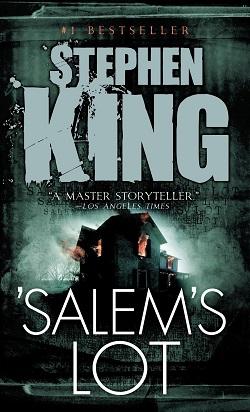Salem's Lot, one of Stephen King's early masterpieces, is a haunting exploration of fear, evil, and the fragility of human existence. Published in 1975, this novel has stood the test of time, captivating readers with its chilling narrative and complex characters. The story unfolds in the seemingly quaint town of Jerusalem's Lot, a place that, beneath its picturesque facade, harbors a darkness that threatens to consume its inhabitants. The blurb hints at a confrontation with unspeakable evil, and King masterfully delivers on this promise, weaving a tale that is both terrifying and thought-provoking.
At its core, Salem's Lot is a story about the return of the protagonist, Ben Mears, to his childhood home. Mears, a writer seeking inspiration for his new novel, finds himself drawn back to the town he left behind, only to discover that it has been transformed by a sinister force. The arrival of the enigmatic and malevolent Kurt Barlow, a vampire who preys on the town's residents, sets off a chain of events that leads to a gripping battle between good and evil. This theme of returning to one's roots, only to confront the darkness that lies within, resonates deeply throughout the narrative.
King's character development is one of the novel's standout features. Each character is intricately crafted, with their own fears, desires, and moral dilemmas. Ben Mears serves as the reluctant hero, grappling with his past and the trauma that lingers in his memories. His relationship with Susan Norton, a local woman who becomes embroiled in the unfolding horror, adds a layer of emotional depth to the story. Their romance is tender yet fraught with tension, as the encroaching evil threatens to tear them apart.
Other characters, such as Mark Petrie, a young boy with an impressive knowledge of horror fiction, and Father Callahan, a priest struggling with his faith, further enrich the narrative. Mark's bravery and resourcefulness contrast sharply with the adult characters' fears, highlighting the theme of innocence lost in the face of overwhelming evil. Father Callahan's internal conflict regarding his faith and the existence of evil adds a philosophical dimension to the story, prompting readers to ponder the nature of good and evil in their own lives.
The setting of Jerusalem's Lot is almost a character in itself. King paints a vivid picture of the town, with its dilapidated houses and eerie atmosphere, creating a sense of foreboding that permeates the narrative. The town's isolation amplifies the horror, as the characters find themselves cut off from the outside world, trapped in a nightmare of their own making. King's ability to evoke a palpable sense of dread is unparalleled, making readers feel as if they are walking the streets of Jerusalem's Lot alongside the characters.
Thematically, Salem's Lot delves into the nature of evil and its impact on individuals and communities. King explores how fear can manifest in various forms, from the supernatural to the psychological. The vampire, often seen as a metaphor for addiction and the darker aspects of human nature, serves as a powerful symbol of the insidiousness of evil. The townspeople's gradual descent into madness and despair reflects the fragility of societal norms when faced with an overwhelming threat.
Moreover, the novel raises questions about the nature of memory and trauma. Ben Mears's return to Jerusalem's Lot forces him to confront his past, revealing how unresolved issues can haunt individuals long after they have left a place behind. This exploration of memory resonates with readers, as many can relate to the idea of returning to a place filled with both fond and painful memories.
King's writing style in Salem's Lot is both accessible and richly descriptive. He has a unique ability to blend horror with deep emotional resonance, making the reader care about the characters and their fates. The pacing of the novel is expertly crafted, with tension building steadily until the climactic confrontation with Barlow. King’s use of foreshadowing and symbolism adds layers of meaning to the narrative, inviting readers to engage with the text on multiple levels.
When compared to other works in the horror genre, such as Shirley Jackson's The Haunting of Hill House or Peter Straub's Ghost Story, Salem's Lot stands out for its exploration of community and the impact of evil on a small town. While Jackson's work delves into psychological horror and the complexities of human relationships, King's novel offers a more visceral experience, combining supernatural elements with a profound commentary on the human condition.
In conclusion, Salem's Lot is a masterful blend of horror, psychological depth, and social commentary. Stephen King has crafted a narrative that not only terrifies but also resonates with readers on a personal level. The themes of evil, memory, and the struggle between good and evil are timeless, making this novel a must-read for fans of the genre. Its impact is enduring, and it continues to inspire discussions about the nature of fear and the darkness that lurks within us all. For those who dare to venture into the world of Jerusalem's Lot, prepare for a journey that will linger long after the final page is turned.









![Meet Me Today [ Tia ]](/upload/pic/manga/meet-me-today---tia--.jpg)














Reviews 0
Post a Reviews: